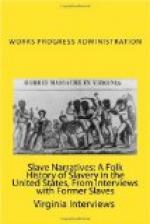“My pa made soap frum ashes when cleaning new ground—he took a hopper to put de ashes in, made a little stool side de house put de ashes in and po’red water on it to drip; at night after gittin’ off frum work he’d put in de grease and make de soap—I made it sometime and I make it now, myself.”
“My step-pa useter make shoes frum cowhides fur de farm han’s on de plantation and fur eve’body on de plantation ’cept ole Marse and his fambly; dey’s wuz diffunt, fine.”
“My grandma wus Pheobie Austin—my mother wuz name Rachel Jackson and my pa wus name Edmund Jackson; my mother and uncle Robert and Joe wus stol’ frum Virginia and fetched here. I don’ know no niggers dat ’listed in de war; I don’ ’member much ’bout de war only when de started talking ’bout drillin’ men fur de war, Joe Sanders was a lieutenant. Marse Carr’s sons, Tom and Willie went to de war.”
“We didn’ had no doctors, only de grannies; we mos’ly used hippecat (ipecac) fur medicine.”
“As I said, Kilgo was de fust overseer I ricollec’, then Sanders wuz nex’ and Joe Sanders after him; John C. Haywood came in after Sanders and when de big gun fiahed old man Brockington wus dere. I never saw a nigger sold, but dey carried dem frum our house and I never seen ’em no mo’.”
“We had church wid de white preachers and dey tole us to mind our masters and missus and we would be saved; if not, dey said we wouldn’. Dey never tole us nothin’ ‘bout Jesus. On Sunday after workin’ hard all de week dey would lay down to sleep and be so tired; soon ez yo’ git sleep, de overseer would come an’ wake you up an’ make you go to church.”
“When de big gun fiahed old man Carr had six sacks uf confederate money whut he wuz carrying wid him to Athens Georgia an’ all de time if any uf us gals whar he wuz an’ ax him ‘Marse please gi us some money’ (here she raises her voice to a high, pitiful tone) he says’ I aint got a cent’ and right den he would have a chis so full it would take a whol’ passle uv slaves to move it. He had plenty corn, taters, pum’kins, hogs, cows ev’ything, but he didn’ gi us nuthin but strong plain close and plenty to eat; we slept in ole common beds and my pa made up little cribs and put hay in dem fur de chillun.”
“Now ef you wanted to keep in wid Marster Carr don’ drap you shoes in de field an’ leave ’em—he’d beat you; you mus’ tote you’ shoes frum one field to de tother, didn’ a dog ud be bettern you. He’d say ’You gun-haided devil, drappin’ you’ shoes and eve’thin’ over de field’.”
“Now jes lis’en, I wanna tell you all I kin, but I wants to tell it right; wait now, I don’ wanna make no mistakes and I don’ wanna lie on nobody—I ain’ mad now and I know taint no use to lie, I takin’ my time. I done prayed an’ got all de malice out o’ my heart and I ain’ gonna tell no lie fer um and I ain’ gonna tell no lie on um. I ain’ never seed no slaves sold by Marster Carr, he wuz allus tellin’ me he wuz gonna sell me but he never did—he sold my pa’s fust wife though.”




